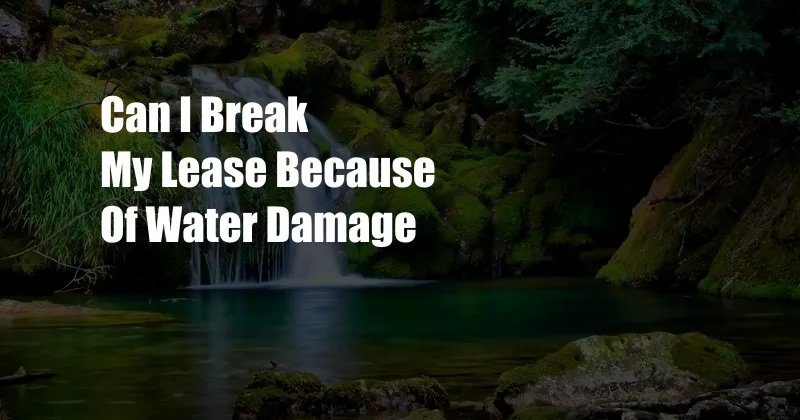
Can I Break My Lease Because of Water Damage?
I had just settled into my new apartment when disaster struck. A pipe burst in the unit above mine, sending water cascading down into my living room. The damage was extensive: soaked carpets, ruined furniture, even electrical issues. I was devastated and immediately began to wonder if I could break my lease.
Water damage can be a major headache for tenants. Not only is it disruptive and frustrating, but it can also raise health concerns and make the property uninhabitable. In some cases, tenants may be able to break their lease if the water damage is severe enough. However, the specific laws and regulations vary from state to state.
Lease Protections for Tenants
In general, tenants have certain rights and protections under the law. These rights include the right to a safe and habitable living space. If the water damage is so severe that it makes the property uninhabitable, tenants may be able to break their lease without penalty.
What Constitutes Uninhabitability?
The definition of uninhabitability can vary depending on the specific circumstances. However, some general factors that may be considered include:
- The extent of the water damage
- The location of the water damage
- The impact of the water damage on the tenant’s health and safety
Steps to Break a Lease Due to Water Damage
If you believe that the water damage in your apartment has made it uninhabitable, it is important to take the following steps:
- Document the damage. Take pictures or videos of the damage and keep a record of any communication with your landlord or property manager.
- Contact your landlord or property manager. Notify them of the damage and request that they take action to repair it.
- If your landlord does not respond, you may need to file a complaint with your local housing authority or legal aid organization.
Tips and Expert Advice
Here are some additional tips and expert advice for tenants who are dealing with water damage:
- Act quickly. The sooner you report the damage to your landlord, the sooner they can take action to fix it.
- Be prepared to provide evidence. If you are claiming that the water damage has made your apartment uninhabitable, you will need to provide evidence to support your claim.
- Be patient. It may take some time for your landlord to repair the damage and make your apartment habitable again.
FAQs on Water Damage and Lease Termination
- Q: Can I break my lease if the water damage was caused by a natural disaster?
A: In most cases, you will not be able to break your lease if the water damage was caused by a natural disaster, such as a flood or hurricane. - Q: What if my landlord does not repair the water damage?
A: If your landlord does not repair the water damage, you may be able to file a complaint with your local housing authority or legal aid organization. - Q: Can I get compensation for my losses due to water damage?
A: In some cases, you may be able to get compensation for your losses from your landlord or your renter’s insurance policy.
Conclusion
Water damage can be a serious problem for tenants. If the damage is severe enough, tenants may be able to break their lease without penalty. However, the specific laws and regulations vary from state to state. If you are dealing with water damage in your apartment, it is important to document the damage, contact your landlord, and take steps to protect your rights.
Are you interested in learning more about your rights as a tenant? There are many resources available online and from local legal aid organizations.